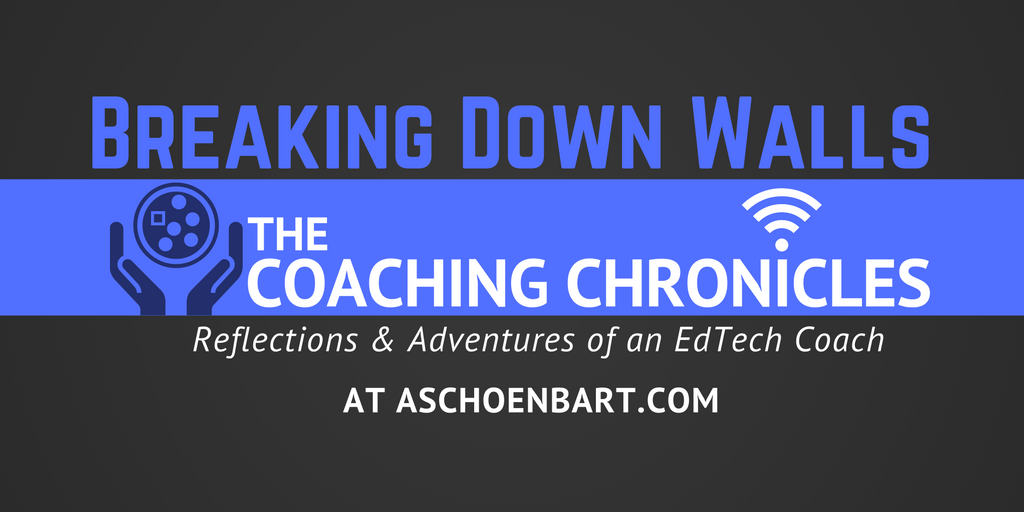The Coaching Chronicles: Breaking Down Walls

This post is the start of a series that’s been forming in my mind for over a year. So often, I write about and reflect on my experiences as a teacher but I rarely write explicitly about my work as an instructional technology coach. This is my second year in a split position, teaching three periods of high school English and working the rest of my day to support teachers in their use of technology. In some ways, it’s the best of both worlds. As a classroom teacher, my coaching is built from my own experiences and relevant, practical teaching and learning.

Breaking Down Walls
Last year, a lot of my job focused on meetings and appointments or supporting infrastructure and curriculum. Simply put, I wasn’t in as many classrooms as regularly as I wanted to be. I wanted to be an embedded coach, working with teachers and students in appointments and meetings, but also in real coaching: co-teaching, push-ins, observations, and so much more. I hoped that by breaking down these walls, I could widen my impact.
And in this time, I’ve learned a lot about working with and supporting teachers. I think (and hope) I’ve grown a lot, too. This year, the challenge of breaking down walls became a priority for me and my team. How could we encourage teachers to seek out coaching? To invite us into classrooms? How do we ask teachers to commit their valuable planning time to coaching without making it an extra burden?
Our teachers are great. I’m sure yours are, too. But a reality of today’s public school system is that we are so often asked to do more with less. There are so many competing initiatives and interests on top of the wonderful work we do with students. How do we find the time?
From Tech Tuesday to Teaching Tech Tuesday
One of our growing initiatives to promote purposeful technology use has been Tech Tuesdays. Once a month, we schedule a day of drop-in professional learning on topics that can impact teaching and learning. Sometimes we focus on a tool like Pear Deck, and other times on a concept like online formative assessment tools. Teachers drop in for a few minutes or a full period to meet their needs.
Although our attendance has been spotty, it’s definitely growing, and we are making an impact. It’s also a fantastic way to gauge future needs for professional learning and to work with staff in a stress-free, individualized setting.
The most common complaint to follow any of our professional learning this year, though, was something like this: “It was good but I need more time to understand it, practice, or see it used.” Sound familiar? For me, this perfectly logical and important comment set off bells in my head: we need to model the technology in authentic classrooms, not just in artificial settings.
Tools and ideas to transform education. Sign up below.
Drop in PD and meetings can be great, but we all need to see these tools and strategies in action. Our students need models and scaffolding to grow--and teachers need the same to be effective learners.
Today was the first of our new Teaching Tech Tuesdays. Instead of meeting in an office, we invited teachers into fifteen different classrooms throughout the school day to see students use the annotation and citation tool Scrible. Our hope is to rotate the tool or skill and to recruit different teachers each month to open their doors as model classrooms. This way, we can demonstrate how technology use might look different across subject areas and share successes throughout the building. Meeting in an office with a coach or two is great, but we can do better.
There were a handful of teachers who took advantage of today’s opportunity. Next time, I hope there will be more. Teaching Tech Tuesday is just one idea, but I hope to see it take off as an inspiration for more collaboration, open doors, and risk taking with technology.
On Tuesdays, we’ve been working on getting the teachers to come to us. In the next Coaching Chronicles post, I’ll explore how I’m trying to go to them and get into more classrooms this school year.
How do you encourage a culture of collaboration and risk taking? Share your challenges or successes with breaking down the walls in the comments or on Twitter @MrSchoenbart.
cross posted at www.aschoenbart.com
Adam Schoenbart is a high school English teacher, Google Education Trainer, and EdD candidate in Educational Leadership. He teaches grades 10-12 in a 1:1 Chromebook classroom at Ossining High School in Westchester County, NY and received the 2014 LHRIC Teacher Pioneer Award for innovative uses of technology that change teaching and learning. Read more at The SchoenBlog and connect on Twitter @MrSchoenbart.
